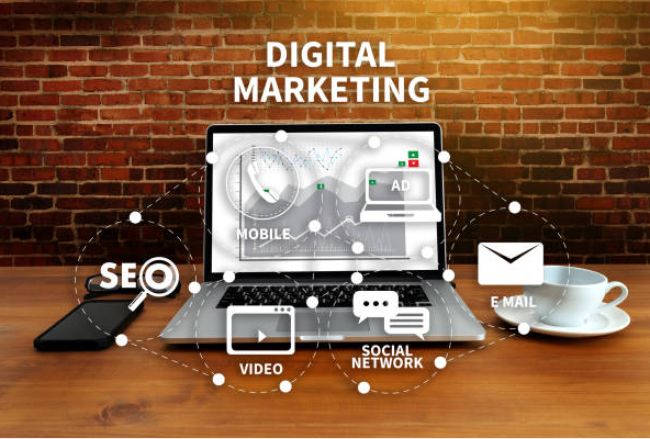Introduction.
Digital marketing has revolutionized the way businesses reach, engage, and convert customers. With the rise of internet usage and digital technologies, traditional marketing methods have shifted to more interactive and measurable strategies. Digital marketing provides businesses with a wealth of tools to communicate directly with their audience, track behavior in real time, and adapt campaigns for optimized results. This article explores key digital marketing strategies, major channels, and the emerging trends that are reshaping the marketing landscape.

Key Digital Marketing Strategies.
1. Search Engine Optimization (SEO) ,SEO is the process of optimizing a website to rank higher in search engine results, such as Google. The goal is to improve visibility and drive organic (unpaid) traffic to a site. SEO focuses on both on-page factors, such as optimizing content with relevant keywords, improving site speed, and structuring data for search engines, and off-page factors like acquiring quality back links from other websites.
A strong SEO strategy involves keyword research, competitive analysis, and regular content updates. Google’s algorithm prioritizes sites that provide valuable and relevant content to users, making quality content the backbone of any SEO effort. In addition, optimizing for local SEO, particularly for businesses targeting specific geographic areas, has become increasingly important as more users search for local services and products.
2. Content Marketing : Content marketing revolves around creating and distributing high-quality, valuable content aimed at attracting, engaging, and converting a target audience. Rather than directly promoting products or services, content marketing focuses on providing useful information that addresses customer pain points, educates them, and builds trust.Content can take many forms: blog posts, eBooks, videos, infographics, podcasts, and webinars. By consistently producing relevant content, businesses can establish themselves as thought leaders and industry experts. Over time, content marketing not only drives traffic but also fosters long-term relationships with customers.
3. Social Media Marketing : Social media marketing involves leveraging platforms like Facebook, Instagram, Twitter, LinkedIn, and TikTok to engage with audiences and promote products or services. It allows businesses to reach users where they are spending significant time online. The visual and interactive nature of platforms such as Instagram and TikTok also allows for creative storytelling that can build brand identity.Organic social media marketing involves creating engaging content and fostering conversations around it. On the other hand, paid social advertising allows businesses to target specific audiences based on demographics, behaviors, and interests. The ability to directly interact with customers through comments, messages, and posts makes social media a powerful tool for customer service and relationship building.
4. Email Marketing : Email marketing remains one of the most effective digital marketing strategies, particularly for nurturing leads and retaining customers. By sending personalized and segmented emails, businesses can keep their audiences informed about new products, special promotions, or company news. Automated email workflows can also nurture prospects through the buyer journey with minimal manual input.
Successful email campaigns focus on delivering value to recipients, whether that’s through exclusive offers, helpful tips, or educational content. Personalization is key; segmented lists ensure that recipients receive content that’s relevant to their interests and needs, improving open and click-through rates. With tools that allow tracking of email performance, businesses can continually refine their messaging for better engagement.
5. Pay-Per-Click (PPC) Advertising : PPC advertising is a model in which advertisers pay a fee each time one of their ads is clicked. This form of paid digital marketing ensures businesses can quickly drive traffic to their websites. Google Ads is one of the most popular PPC platforms, but ads can also run on social media platforms like Facebook and LinkedIn.PPC allows for highly targeted advertising, where businesses can define their audience based on search keywords, demographics, or interests. It provides instant visibility, particularly for competitive keywords that might take time to rank for organically. However, effective PPC requires careful monitoring and optimization to avoid costly ad spend and maximize return on investment (ROI).
6. Affiliate Marketing : Affiliate marketing is a performance-based strategy in which businesses partner with affiliates (other companies or individuals) to promote their products or services. Affiliates earn commissions based on the number of sales or leads generated through their promotional efforts.This strategy allows businesses to extend their reach to new audiences without upfront marketing costs. For affiliates, the model offers the potential for passive income by promoting products they believe in. Affiliate marketing is especially prevalent in the e-commerce industry, where influencers and content creators recommend products to their followers.
7. Influencer Marketing : Influencer marketing leverages individuals with large followings on social media to promote products and services. Businesses partner with influencers who align with their brand values and target audience to increase visibility and credibility. Influencers often create content that showcases how they use or endorse a product, making their recommendations feel authentic to their audience.Influencer marketing can range from micro-influencers (with a few thousand followers) to celebrity influencers with millions of followers. While macro-influencers provide broad reach, micro-influencers often offer higher engagement rates due to their niche, loyal audiences.

Major Channels in Digital Marketing
1. Search Engines : Search engines like Google and Bing are foundational to digital marketing. They drive both paid (PPC) and organic traffic through search engine results pages (SERPs). Optimizing for search engines through SEO ensures long-term traffic, while paid ads ensure immediate visibility.
2. Social Media Platforms : Social media platforms such as Facebook, Instagram, and TikTok are key channels for businesses to engage with their audiences. Each platform caters to different demographics and content types, making it essential to tailor content to the platform’s style and user expectations.
3. Email : Email remains a direct and personal channel for communicating with customers. With the ability to segment audiences and personalize messaging, email marketing can be an extremely effective tool for nurturing customer relationships and driving repeat business.
4. Websites and Blogs : A business’s website is often its most valuable digital asset. It serves as the central hub for information about products or services, lead generation, and sales. Blogs, in particular, help drive organic traffic through content marketing and SEO, while providing value to visitors.
5. Video Platforms : YouTube and other video-sharing platforms have become essential for brands looking to engage audiences through video content. Video content is particularly compelling as it captures attention, demonstrates products in action, and delivers complex messages in an easily digestible format.
Emerging Trends in Digital Marketing
1. Artificial Intelligence (AI) and Automation : AI is transforming digital marketing by enabling advanced data analysis and personalized experiences. Chat bots, for example, provide 24/7 customer service, while machine learning algorithms predict user behavior, helping marketers optimize campaigns in real time. AI also powers automation in email marketing, social media scheduling, and content generation.
2. Voice Search Optimization : With the rise of voice-activated devices like Amazon Alexa and Google Assistant, optimizing content for voice search is becoming essential. Voice search queries tend to be longer and more conversational, so content needs to be adapted to address these types of searches.
3. Video Marketing : Video content continues to grow in popularity. Platforms like YouTube, TikTok, and Instagram Stories provide businesses with the opportunity to create engaging video content that resonates with audiences. Live streaming, product demos, and video testimonials have also become important tools for increasing brand engagement and trust.
4. Personalization and Data-Driven Marketing : Personalized marketing is becoming the norm, with consumers expecting tailored experiences. Using data analytics, businesses can segment their audiences and deliver personalized content, ads, and offers. The more personalized the marketing, the higher the likelihood of conversion and customer retention.

Conclusion.
Digital marketing has become a central part of modern business strategy. From SEO to social media, email marketing, and emerging technologies like AI, businesses have a wide array of tools at their disposal to reach and engage their target audience. As technology evolves, so do the opportunities for more targeted, personalized, and efficient marketing efforts. Companies that stay ahead of these trends and effectively utilize digital marketing strategies are well-positioned to succeed in the increasingly competitive online landscape.




